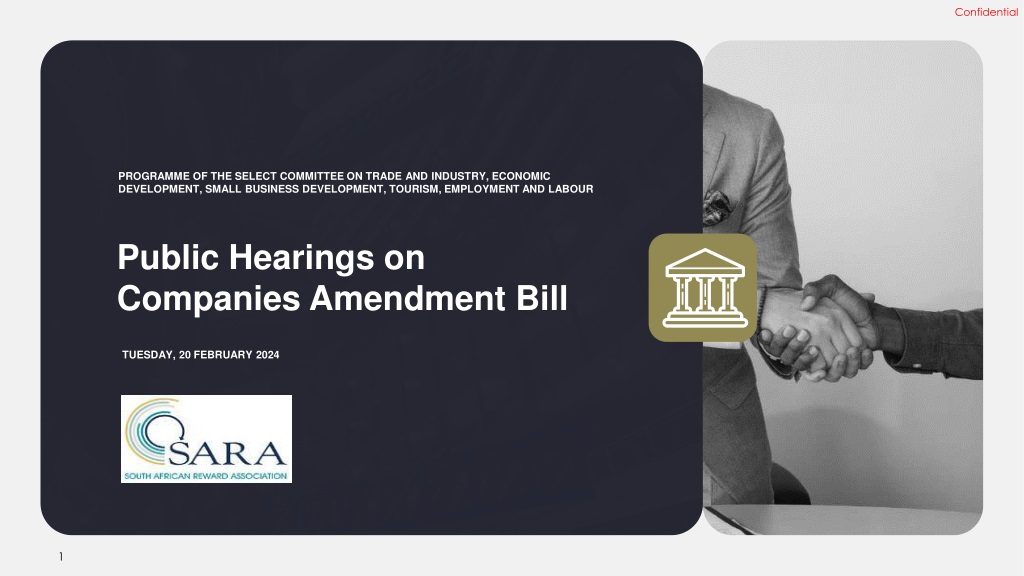

Replay
0 likes | 0 Views
The South African Reward Association (SARA) presents comments supporting well-governed remuneration systems and a living wage for vulnerable employees, emphasizing sections 26, 30A, and 30B of the Companies Amendment Bill. They propose clarifications on employee definitions, remuneration reporting, and shareholder resolutions to align with international practices and business objectives.

E N D
Confidential PROGRAMME OF THE SELECT COMMITTEE ON TRADE AND INDUSTRY, ECONOMIC DEVELOPMENT, SMALL BUSINESS DEVELOPMENT, TOURISM, EMPLOYMENT AND LABOUR Public Hearings on Companies Amendment Bill TUESDAY, 20 FEBRUARY 2024 1
Confidential Contents Contents Slide# 3 4-8 9 1 2 3 Introduction Comments and proposals Q&A 2
Confidential Introduction Thank you for the opportunity to present our comments We commend the work of the Select Committee (SC), and duly note the incorporation of some of the previous feedback provided. We are supportive of a well governed, effective remuneration system that promotes fair, responsible and performance driven remuneration for all employees in SA. We further support a living wage for the most vulnerable employees in our society as a means to foster job creation, economic growth and a sustainable economy. We appreciate the opportunity to represent the South African Reward Association (SARA) and the Institute of Directors in South Africa’s Remuneration Committee Forum (IoDSA Remco Forum) The members of this combined workgroup are recognised subject matter experts and will answer any questions the SC may have as part of this presentation: Ronel Nienaber: IoDSA Remco Forum Chair Mr Nicol Mullins: SARA President; and SARA Advocacy Committee/Exco members: Ms Lindiwe Sebesho, Dr. Mark Bussin, Mr. Laurence Grubb and Mr. Martin Hopkins Our comments relate specifically to the proposed Sections 26, 30A and B, for kind consideration by the SC. 3
Confidential Comments and Proposals Clause 6 | Section 30B Reference Comment Proposed wording (impacted sections highlighted in yellow) 30B. (1) In this section— 30B(1) In this section- The definition of an “employee” under s213 of the LRA, is extremely broad and includes “(a) any person, excluding an independent contractor, who works for…. or is entitled to receive any remuneration; and (b) any other person who in any manner assists in carrying on or conducting the business of an employer…”. (a) ‘‘total remuneration’’ means all salary and benefits received including any employer contributions to benefit funds and any short-term or long-term incentives including share options and incentive awards; … (b) “employee” means an employee as defined in section 213 of the Labour Relations Act, 1995 (Act No. 66 of 1995); provided that such an employee is a permanent full-time employed person who has been in service for the full period under review; and… This means that part-time, non-permanent, learners, expatriates etc are all included in this definition. If an employee is employed to only work for one month, and pay gap is reported on an annual basis, it will completely distort the data which will become meaningless, inappropriate and grossly misinterpreted. (b) ‘‘employee’’ means an employee as defined in section 213 of the Labour Relations Act, 1995 (Act No. 66 of 1995); and (c) ‘‘committee’’ means the remuneration committee of the company or any other committee of the company responsible for remuneration matters. 4
Confidential Draft CAB [B27B-2023] Section 30B Remuneration report consist of: • Background statement • Remuneration policy (subject to ordinary resolution under S30A.(2)(a) • Implementation report 5
Confidential Comments and Proposals Clause 6 | Section 30B Reference Comment Proposed wording (impacted sections highlighted in yellow) (4) If at the annual general meeting the remuneration report is not approved by ordinary resolution as contemplated in subsection (2)— No other country has such a requirement in place and the current requirement for an advisory vote is far more aligned with international practice. (4) If at the annual general meeting the implementation report is not approved by ordinary resolution as contemplated in subsection 30B(2) - In our view, this proposal does not contribute to the objectives of “ease of doing business, user-friendly and well-established principles, not over burdensome on business, attract foreign investors, or achieve equity between directors and senior management and shareholders and workers” – the implementation report is the outcome of the policy (in other words a report on what has already been implemented and cannot be amended post implementation); the intended vote on the policy, indeed meets these objectives and should suffice without subjecting the implementation report to an ordinary resolution as well. If the honorable SC, despite these objections, proceeds with the proposal, the reference to remuneration report, should be changed to implementation report. 6
Confidential Comments and Proposals Clause 6 | Section 30B Reference Comment Proposed wording (impacted sections highlighted in yellow) (a) the committee must, at the next annual general meeting, present an explanation on the manner in which the shareholders’ concerns have been taken into account; and • This is currently impossible to implement as shareholders are not compelled (and in many cases not willing) to share their voting practices with companies. Insert new par (a) (a) all shareholders who did not support the resolution must provide the committee with their reasons for the non- approval, within a period of two months after the annual general meeting; Further, shareholders, including retail investors, who share their voting practices, do not share their contact details with the company; and some investors are international tracker funds that do not engage with companies regarding the voting outcomes of a shareholder meeting. • (b) the committee must, at the next annual general meeting, present an explanation on the manner in which the shareholders’ concerns have been taken into account. It is therefore impossible to understand their concerns if they do not disclose their voting practices and the motivations that underlie those. • We therefore recommend the inclusion of a requirement for shareholders to provide concerns or reasons for non- approval to the committee to aid engagement and the committee being able to effectively address concerns to avoid a second non-approval. • 7
Confidential Comments and Proposals Clause 6 | Section 30B Reference Comment Proposed wording (impacted sections highlighted in yellow) (b) subject to subsection (6), the directors who are not involved in the day-to-day management of the business of the company and who serve on the committee must stand for re-election as members of the committee at the annual general meeting at which the explanation is presented. The Committee which deals with remuneration matters, is not necessarily a statutory committee. Human Capital, Remuneration, People, and Nominations Committees typically deal with remuneration related matters. Suggest that this section be deleted as it is not implementable in its current format. As that Committee is not a statutory committee, the members thereof, are not elected thereto by shareholders and therefore the proposed “re-election as members of the committee” is not legally tenable unless this is addressed elsewhere in the Companies Amendment Bill. In addition, as the Committee(s) which deals with remuneration matters, may have a mandate which go beyond remuneration, they may also include some executive director members. If the non-executive members are required to stand down, it may leave the executive members as the only members remaining. This is an unintended consequence of the current wording. 8
Confidential Comments and Proposals Clause 6 | Section 30B Reference (5) Subject to subsection (6), if at the annual general meeting in the year immediately following the year contemplated in subsection (4), the remuneration report in respect of the previous financial year is also not approved by ordinary resolution of shareholders— Comment As per previous rationale, “remuneration report” to be replaced with “implementation report”. Proposed wording (impacted sections highlighted in yellow) (5) Subject to subsection (6), if at the annual general meeting in the year immediately following the year contemplated in subsection (4), the implementation report in respect of the previous financial year is also not approved by ordinary resolution of shareholders— (a) the directors who are not involved in the day-to-day management of the business of the company and who serve on the committee may continue to serve as directors provided they successfully stand for re-election at that annual general meeting; and The proposed sanction is considered unfair, unjust and disproportionate in relation to members of other committees. The proposed sanction will lead to board members no longer being prepared to serve on the committee which deals with remuneration matters which will have devastating consequences for employees at all levels. (a) the directors who are not involved in the day-to-day management of the business of the company and who serve on the committee may continue to serve as directors subject to rotation requirements as per the Act or MOI and must immediately resign from the committee; and (b) will not be eligible to serve on the committee for a period of two years thereafter. By removing the entire Remco for a period of 2 years, there is significant loss of continuity and also the risk that new members do not have the required skills to competently fulfil this role. (b) will not be eligible to serve on the committee for a period of one year thereafter. Not only will removal have a significant reputational impact which should be sufficiently punitive, but for a 12-month period will be seen as an extremely punitive and unjust consequence in terms of global market practice. 9
Confidential THANK YOU THANK YOU Q&A Contact Details: Cynthia Badenhorst General Secretary Tel: +27 11 061 5000 Email: Cynthia@vdw.co.za 10
